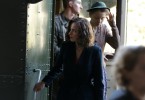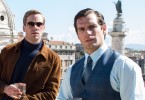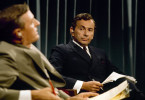Game of Thrones
“High Sparrow”
(HBO)
B+
After two episodes of setting foreshadowing things to come, “High Sparrow” digs deeper into the characters and what ultimately motivates them (finally). It was more of an introspective episode and, as a result, it’s the most subtle and interesting offering of the season so far.
Cerci seems more unprotected as the season goes on. With both of her brothers out of the picture, her father dead, and her young, soft-hearted son marrying Margaery Tyrell, she is losing her grasp on power. This vulnerability takes shape when she goes to see Margaery after the wedding. Margaery is at a table with her girlfriends, laughing and enjoying a late brunch as the old queen bee strolls up to have a conversation. It’s like watching the once-popular high school cheerleader being overshadowed by the younger, hipper new girl in town. We wait for Cerci to come up with her usual quip/jab at her opponent, but it never comes. Margaery is sugar-sweet to Cerci and Cerci just kind of, well, takes it. The conversation comes to a close and Cerci walks away as she hears the table of girls giggling, almost mockingly.
Cerci and the Lannister name are being overtaken by the younger generation. Times are a-changin’ and I still fear that Cerci has something coming. She isn’t in control like she wants to be, or, in her eyes, should be.
Arya begins her training inside the House of Black and White with Faceless Man Jaqen H’ghar. This “house” is dimly lit, people are cleaning floors, and no one really talks to one another, as if training to become a Faceless Man only takes a “wax on, wax off”-type mentality. Jaqen finally provides some wisdom and, in response, Arya relinquishes her things amongst the sea — except for her tiny sword, Needle (thank god), because she can’t let go of the one thing that defines her as Arya Stark. Needle is a symbol of who she really is and why she wants to become a Faceless Man to begin with: revenge.
Brienne and Podrick, meanwhile, begin to open up to each other and share stories of their pasts, and Jon Snow reminds us how much he has come along. He’s now cracking jokes and cutting off heads after orders are being denied. At least when this head rolls, it’s saying something about the decapitator without being gratuitous. Snow is ready to be respected and followed.
Similarly, Sansa Stark is trying to play the game now rather than be a victim. Lord Baelish is advising her, but it could bite him in the end. Sansa is set to marry — thanks to Lord Baelish’s scheming — the questionably schizophrenic/good, old fashioned insane Ramsay Snow. Reek, the “hound dog” formerly known as Theon Greyjoy, is avoiding Sansa’s arrival after his betrayal to the Starks. It isn’t hard for Greyjoy to hide his face considering he now looks like one of Mick Jagger’s roadies after a seven-day binge. How long can Reek roam about with his tail between his legs before his manic master introduces his bride-to-be to his human pet?
Meanwhile, Roose Bolton, the warden of the North who set up this marriage arrangement, struggles to trust Lord Baelish, even after Baelish’s hand-delivery of Sansa. And who in their right mind would trust Baelish? He constantly has a smirk on his face like the one who took the cookie from the jar. Although Baelish brings unease (as usual), he does seem to care for Sansa in some way, exemplified by his short conversation with Ramsay. Baelish mentions that he doesn’t know much about Ramsay and seems worried about the situation, either out of fear for Sansa’s fate or that Ramsay is a the wild card that will ruin his plan. That plan is still coming together.
“High Sparrow” did an excellent job reminding us how these characters have grown and changed over the show’s five seasons. Through slowing down and actually using conversation, in a sense, you really get to know them again. It has real moments of reflection, rebuilding our love for these characters rather than seeing them run around and finding themselves in trouble. It’s a necessary reminder of why we care about these characters — the reason we watch television in the first place.





